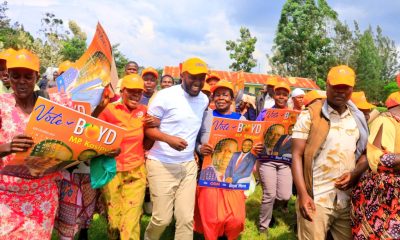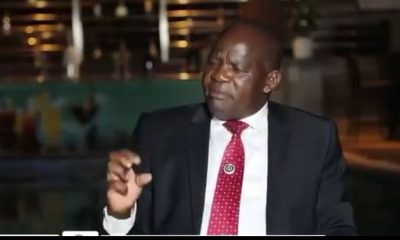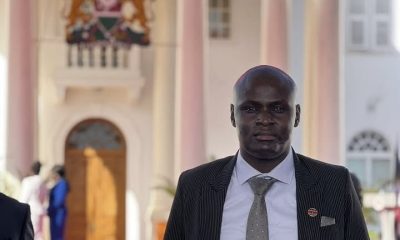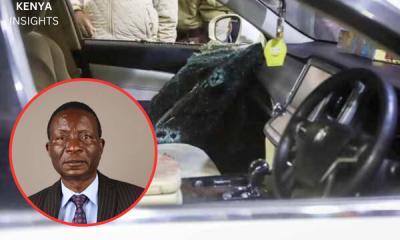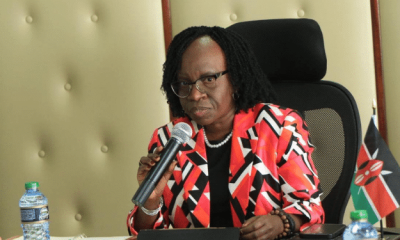Investigations
Ong’ondo Were’s Brother Claims State Had A Hand In His Assassination Exposing Kasipul’s Deadly Political Underbelly
Paul Were’s accusations against the government center on what he describes as deliberate protection of the perpetrators and willful blindness to escalating violence.
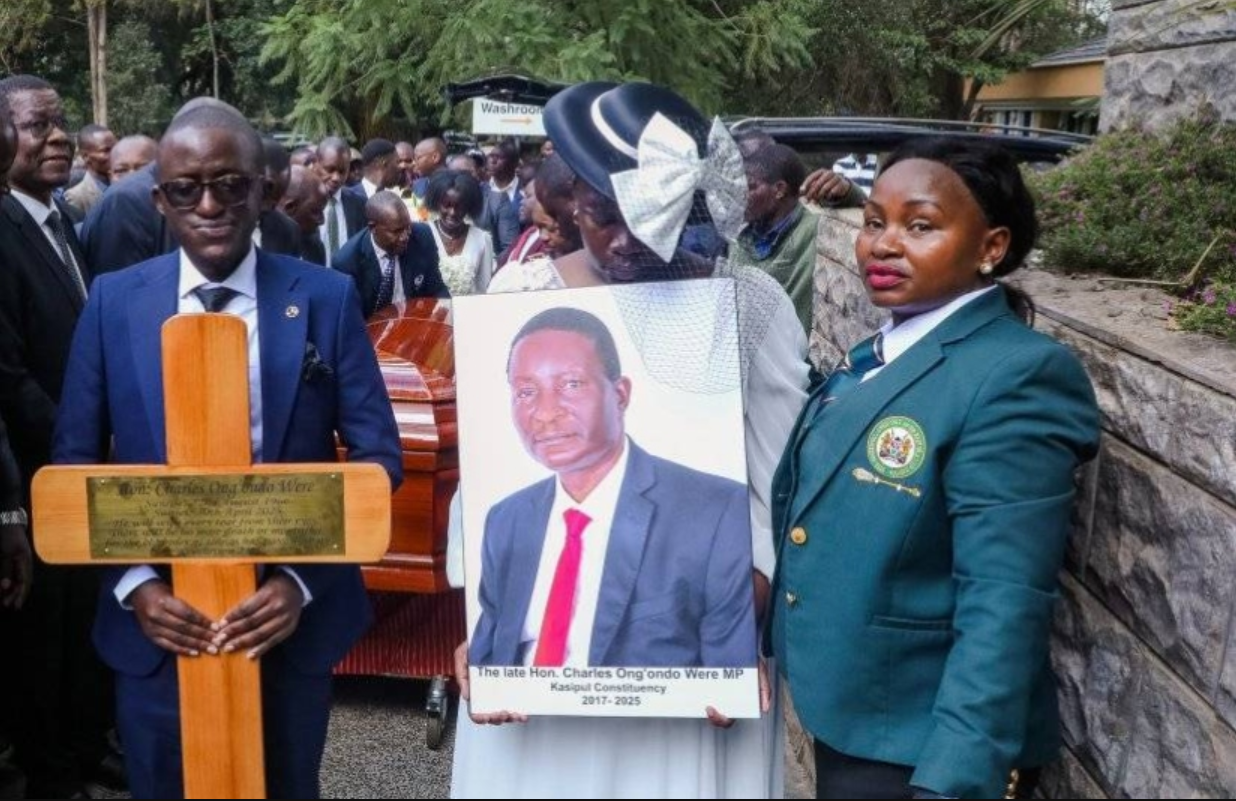
Brother of slain legislator points finger at state security apparatus while constituency reels from cycle of violence that has claimed multiple lives
The assassination of Kasipul MP Charles Ong’ondo Were on April 30, 2025, has torn open a festering wound in Kenya’s political landscape, exposing a constituency where funerals become battlegrounds, politicians deploy armed youth gangs, and the line between law enforcement and political violence has dangerously blurred.
In a damning indictment delivered a local TV station on Sunday, June 1, Paul Were, brother of the slain parliamentarian, directly accused the government of enabling his brother’s murder through deliberate inaction and protection of those who terrorized the MP in the months leading to his death.
“These people were being protected from a certain quarter, and in that, we really blamed the government because it was very ugly,” Paul Were told a local television station, his voice heavy with grief and anger.
A murder foretold
The assassination of the second-term ODM legislator was not a random act of violence but the culmination of months of escalating threats that authorities allegedly ignored despite repeated warnings.
On February 8, just weeks before his death, MP Were had publicly revealed a chilling assassination plot against him.
“A former MCA and his associate are planning to bring police officers from outside Kasipul and youths from Kisumu to a function which I will attend to cause chaos and shoot me dead,” Were had warned, his words proving tragically prophetic.
The execution itself bore the hallmarks of a professional hit.
At 7:24 PM on April 30, after leaving Parliament, Were stopped at an M-Pesa agent to withdraw Sh20,000 before heading home to Karen via Ngong Road.
At the City Mortuary roundabout, assassins on a motorcycle ambushed his vehicle.
A pillion passenger dismounted, walked to the co-driver’s seat, and fired five shots at close range, killing the MP instantly before escaping into Nairobi’s evening traffic.
A constituency under siege
The murder exposed Kasipul as a constituency where political competition has devolved into a Hobbesian nightmare of violence, intimidation, and revenge killings.
Residents paint a harrowing picture of a place where attending a funeral requires courage, where youth armed with machetes and clubs patrol political events, and where critics of powerful figures risk brutal retaliation.
Edward Okwanyo’s ordeal exemplifies this reign of terror. At a funeral in Kachola village on April 28 – just two days before Were’s assassination – Okwanyo was attacked with an iron bar after the MP arrived with supporters he described as armed goons.
“The weapons are hidden in their clothes. Some of them even struggled to sit down properly. One could easily spot those who had machetes or clubs hidden in their trousers,” Okwanyo recalled, his bloodied image later circulating on social media as a symbol of Kasipul’s descent into chaos.
According to Okwanyo, who had fallen out with the MP, he was marked as a wanted man by youth gangs that accompanied Were to constituency events.
“They would hold meetings and discuss people they did not like and how they could be punished,” he claimed. “Some people would be attacked in hotels. Some of his critics would be stabbed and left with permanent injuries.”
The death trail
Political violence in Kasipul has left a trail of bodies that extends far beyond the MP’s assassination. In April 2024, exactly one year before Were’s murder, Evance Okoda was brutally killed, his mutilated body dumped outside his rental house in Oyugis Town with his palm severed.
Okoda, who had worked as a bodyguard for multiple politicians including former Nairobi Governor Evans Kidero and former Migori Governor Okoth Obado, was providing security for businessman Philip Aroko – one of Were’s fierce critics – at the time of his death.
“We were shocked when we went to the mortuary. He was defaced… His missing palm was taken to the murder scene after a week. This was after we cried out that we could not bury the body with a part of it missing,” said Lilian Okoda, the victim’s stepmother.
The gruesome details emerging from Kasipul read like a catalog of medieval torture: noses cut off, limbs chopped off, ears lost to machete blades, skulls broken with crude weapons. Property destruction adds another layer to this landscape of terror.
Government’s alleged role
Paul Were’s accusations against the government center on what he describes as deliberate protection of the perpetrators and willful blindness to escalating violence.
He cited a specific incident in Kalando where his brother was trapped inside a house while youth pelted him with stones.
“When the investigation report emerged, it stated that the MP was the aggressor, yet he was the one locked inside the house,” Paul Were explained.
“So, that was a clear indication that these people were being protected from a certain quarter.”
The family spokesperson revealed that Were had complained “bitterly for five months” and “wrote to the DCI in Nairobi, but to our surprise, no action was taken. People sent him threatening WhatsApp messages.”
National Assembly Speaker Moses Wetang’ula confirmed that Were had security concerns, revealing: “At one time, he had a problem with his security and they took his gun. I instructed the Clerk of the National Assembly and within one week it was rectified.”
Even opposition leader Raila Odinga corroborated the MP’s fears, recounting how Were had jumped into his car during a Luo cultural festival, warning that people with “bad intentions” were trailing him.
The enforcement officers controversy
Particularly troubling are allegations that Homa Bay County government enforcement officers participated in political attacks.
Multiple sources, including Okwanyo, claim these officials were deployed against Were’s critics.
“I know some of them by name. I even called them out, but they went ahead to execute their mission,” Okwanyo alleged.
However, Isaac Ongiri, the Homa Bay County Devolution and Governance Chief Officer, has vehemently denied these claims: “We have seen such claims, that’s not true… county has disciplined directorate, much-civilised inspectorate. They don’t engage in politics.”
Despite the family’s accusations of government complicity, law enforcement agencies have made significant progress in the murder investigation.
Multiple arrests have been made, with suspects including William Imoli Shighali (alias Omar Shakur), Douglas Muchiri Wambugu, David Mihigo Kagame, and police officer Juma Ali Hikal arraigned in court.
The Directorate of Criminal Investigations has reportedly recovered crucial evidence and traced the killers’ movements through CCTV footage analysis.
Dr. Omollo, speaking during a visit to Rangwe Constituency, assured residents that “the DCI has now narrowed down individuals believed to have pulled the trigger.”
The political stakes
Paul Were’s assertion that his brother was killed because of “the politics of Kasipul and that of the Homa Bay ODM chairmanship” points to the high stakes driving this violence.
The assassination came amid intense competition for political control in the constituency and broader county, with various factions willing to employ extreme measures to eliminate opponents.
The murder has already triggered speculation about succession, with several names being floated for the anticipated by-election.
This political maneuvering occurs against the backdrop of a constituency traumatized by violence and a family demanding justice not just for Were’s murder, but for what they see as systemic failure to protect elected officials from known threats.
The contrast between progress in investigating Were’s high-profile assassination and the lack of resolution in other cases highlights persistent patterns of impunity.
While suspects in the MP’s murder face charges, families like the Okodas still wait for answers about their son’s brutal killing, raising questions about whose lives matter in Kenya’s justice system.
Suba North MP Millie Odhiambo’s criticism of media coverage during Were’s funeral – “You cannot paint somebody like a demon when he has no voice” – reflects the complex legacy of a politician whose supporters describe as peace-loving but whose critics paint as orchestrator of violence.
Were’s assassination represents more than a single act of political violence; it exposes the dangerous militarization of Kenyan politics, where youth gangs serve as political foot soldiers and violence becomes an accepted tool of competition.
The allegations of government complicity, if proven, would represent a fundamental breakdown of the state’s duty to protect its citizens, including elected officials.
As investigations continue and political temperatures rise ahead of the inevitable by-election, Kasipul stands as a stark reminder of how quickly democratic competition can descend into deadly conflict when institutions fail and impunity reigns.
The question now facing Kenya is whether Were’s assassination will mark a turning point toward accountability or merely another chapter in a constituency’s tragic slide into political chaos.
Kenya Insights allows guest blogging, if you want to be published on Kenya’s most authoritative and accurate blog, have an expose, news TIPS, story angles, human interest stories, drop us an email on [email protected] or via Telegram
-

 Business2 weeks ago
Business2 weeks ago‘They’re Criminals,’ Popular Radio Presenter Rapcha The Sayantist Accuses Electric Bike Firm Spiro of Fraudulent Practices
-

 Business1 week ago
Business1 week agoIt’s a Carbon Trading Firm: What Kenyans Need to Know About Spiro’s Business Model Amid Damning Allegations of Predatory Lending
-

 Business1 week ago
Business1 week agoManager Flees Safaricom-Linked Sacco As Fears Of Investors Losing Savings Becomes Imminent
-
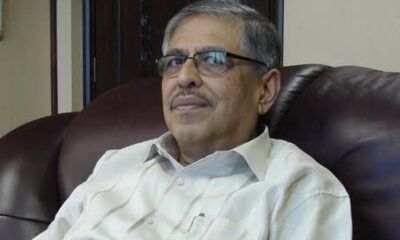
 News1 week ago
News1 week agoWoman Accused in High Defamation Blames AI As Case Exposes How Mombasa Billionaire Mohamed Jaffer Allegedly Sponsored Smear Campaign Linking Joho’s Family To Drug Trafficking
-

 Investigations2 weeks ago
Investigations2 weeks agoDisgraced Kuscco Boss Arnold Munene Moves To Gag Media After Expose Linking Him To Alleged Sh1.7 Billion Fraud
-
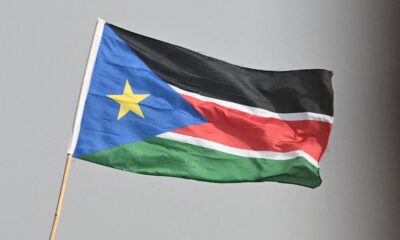
 Africa2 weeks ago
Africa2 weeks agoDisgraced Oil Trader Idris Taha Sneaks Into Juba as Empire Crumbles
-

 Investigations2 weeks ago
Investigations2 weeks agoFraud: How Sh235 Million Donor Cash For Nyamira Residents Was Embezzled Through Equity Bank Under Governor Nyaribo’s Watch
-

 Investigations1 week ago
Investigations1 week agoIntelligence Report Links Budding Politician James Mabele Magio To International Scammers Ring

